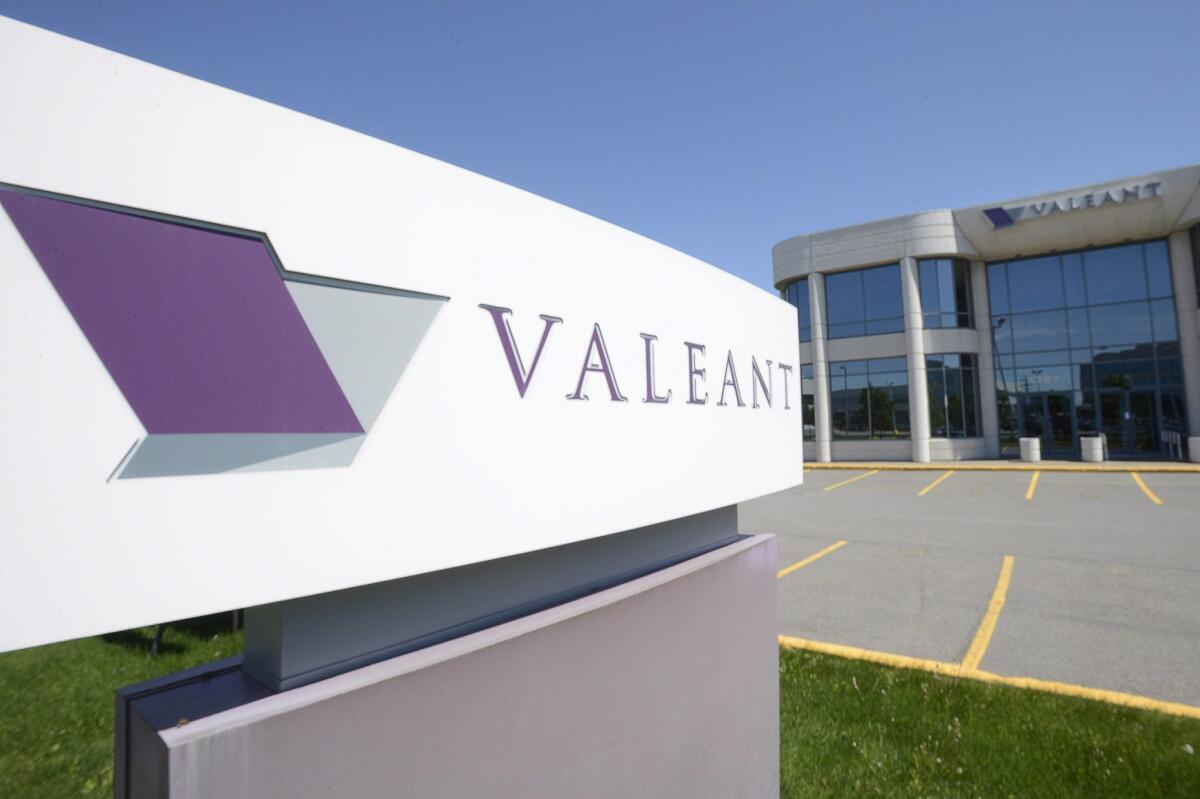Valeant’s outlook for the quarter, year and 2016 grows grim

The head office and logo of Valeant Pharmaceuticals is seen in in Montreal.
- Share via
Embattled Valeant Pharmaceuticals Inc. has slashed its expectations for the fourth quarter and all of 2015 and issued a guarded outlook for 2016, primarily due to lower sales after Congressional and media scrutiny forced it to end a questionable distribution arrangement for its lucrative dermatology and ophthalmology medicines.
Chief Executive Officer Michael Pearson said Wednesday that Valeant should be judged based on its ongoing growth and strategy and its “great brands,” not its small research budget or the controversial business practices that have triggered government probes and created turmoil.
“We’ve ignored the external factors and we’re continuing to grow, grow, grow. We should be measured on that,” Pearson told analysts and investors during a half-day presentation on the company’s commercial operations and research programs.
Shares of the Canadian drug company jumped 5.9%, or $6.46, to $116.13 in morning trading Wednesday, continuing a rally that started Tuesday after Valeant announced a new distribution deal with Walgreens and plans to line up more pharmacies to sell its products.
The stock had tumbled since hitting an all-time high in August, as Valeant’s business model and pricing were scrutinized by industry analysts and members of Congress.
Valeant on Wednesday lowered its per-share 2015 profit expectations to $10.23 to $10.33, from between $11.67 and $11.87 — well short of the $11.11 that Wall Street had projected. Valeant also chopped its outlook for the current quarter to $2.55 to $2.65 per share, from $4.00 to $4.20. Analysts expect, on average, $3.47 per share.
For 2016, Valeant expects adjusted earnings to range between $13.25 and $13.75 per share, below expectations for $14.20.
Valeant has grown rapidly since Pearson joined the then-small company in 2008 and instituted a strategy of buying smaller drug developers, hiking drug prices and then slashing spending on research on new drugs. Among the more egregious examples, Valeant bought the life-saving heart drugs Nitropress and Isuprel in February, then tripled the price of one and raised the other sixfold.
Pearson noted the company was the first to do a tax inversion, moving its official tax headquarters from the U.S. to Lavel, Quebec, to reduce its tax rate, and that it now has the pharmaceutical industry’s lowest tax rate.
He said Valeant could get three new drugs approved next year, when the company plans to use its cash flow to pay down debt, rather than acquire more businesses.
“Next year, we’ll be about a $13 billion company. We will have double-digit organic growth, not just next year, but the year after that and the year after,” Pearson predicted.
He said the 20-year-deal with Walgreens, to which it will directly supply its dermatology and ophthalmology medicines at a slight discount, “is going to change the industry and create tremendous value for both companies.”
The Walgreens deal replaces Valeant’s arrangement to have those products — which account for about 40% of revenue — distributed by specialty mail-order pharmacy Philidor. Valeant cut ties with that company in October, amid allegations Philidor created a network of “phantom pharmacies” to steer pharmacy benefit managers toward Valeant’s more-expensive drugs over cheaper alternatives, and that Valeant executives were involved in running Philidor.
Congressional committees have targeted Valeant as they investigate huge hikes in prices for some drugs, which have become a top concern for consumers and a big issue in the 2016 presidential campaign. After the heart drug price increases drew scrutiny in the summer, investors began selling off Valeant shares, which had peaked at nearly $264 in August. The stock’s slide worsened when the Philidor allegations emerged, and shares hit a $69 low.
On Wednesday, the ranking Democrat on the House Committee on Oversight and Government Reform demanded Valeant supply previously requested and additional documents on its price hikes and its dealings with Philidor. Rep. Elijah E. Cummings, D-Maryland, wrote to Pearson, asking the Valeant CEO to provide the documents and interviews with company officials by Jan. 8, 2016, before a committee hearing on soaring medication prices.
“Your refusal to provide any documents or witnesses is obstructing this congressional investigation and preventing a full understanding of your company’s suspect actions,” Cummings’ letter states, adding Pearson should comply voluntarily so “a subpoena will not be necessary.”
MORE FROM BUSINESS
Virgin America to fit 24% more passengers in new planes
Apple Maps now includes transit information for Los Angeles
‘Star Wars’ empire could grow by $180 million to $220 million this weekend
More to Read
Inside the business of entertainment
The Wide Shot brings you news, analysis and insights on everything from streaming wars to production — and what it all means for the future.
You may occasionally receive promotional content from the Los Angeles Times.










